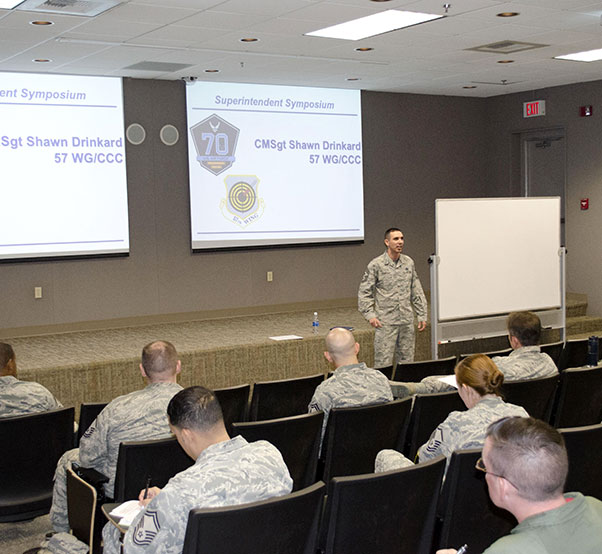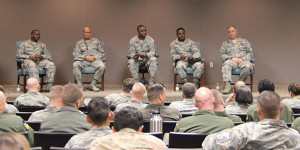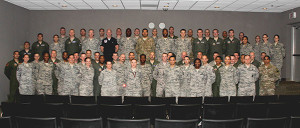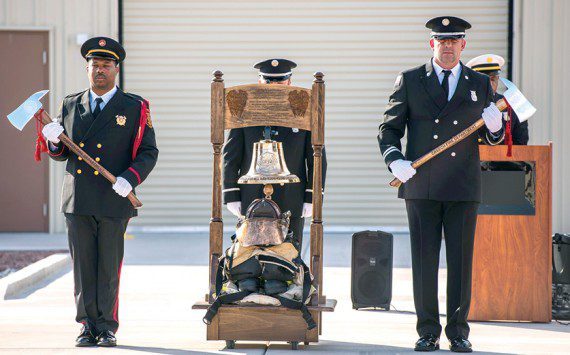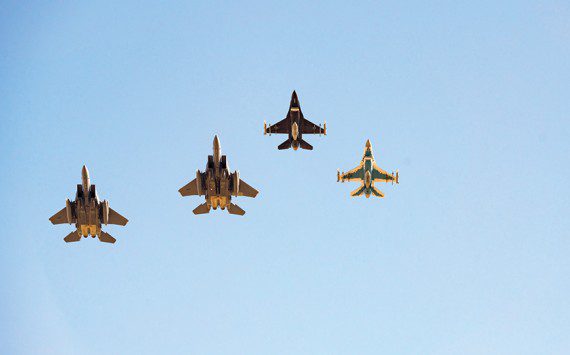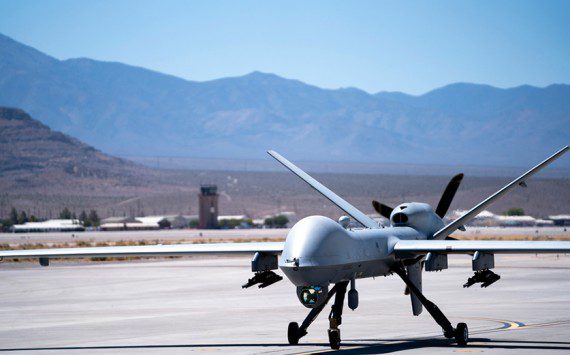Chief Master Sgt. Christopher Hurst, 99th Security Forces Squadron superintendent, Chief Master Sgt. John Moore, 757th Aircraft Maintenance Squadron superintendent, Chief Master Sgt. Marvin Parker, 99th Logistics Readiness Squadron superintendent, Chief Master Sgt. Jerry Dunn, 99th Medical Group superintendent, and Chief Master Sgt. Jeff Taylor, 732nd Operations Group superintendent, answer questions on a chief master sergeant panel during the U.S. Air Force Weapons School’s Squadron Superintendent Symposium at Nellis Air Force Base, Nev., Sept. 21, 2017. The symposium helps prepare prospective superintendents and Airmen currently assigned to squadron superintendent roles.
The U.S. Air Force Weapons School at Nellis Air Force Base, Nev., helped move the future forward Sept. 19 to 22 with a symposium intended to accelerate the professional development of prospective superintendents and Airmen currently assigned to squadron superintendent roles.
The “Integration and Growing Leaders: Superintendent Symposium” stemmed from the Chief of Staff of the Air Force’s “Revitalizing the Squadron” focus area, the Air Combat Commander’s “Ready Airmen” priority, and the USAF Warfare Center Commander’s “Growing Airmen Leaders” priority.
“The Air Force is currently looking at developing a squadron superintendent and group superintendent course,” said Chief Master Sgt. Jay Harris, Weapons School Superintendent. “The feedback and best practices we will generate from this symposium could ultimately serve as a blueprint for these future courses.”
The Weapons School held its first symposium for squadron superintendents in 2016. The impetus for that symposium stemmed from other leadership initiatives the Weapons School has implemented to target the professional development of its personnel. It was successful but limited to Weapons School personnel.
“This year, the USAFWC Command Chief, Chief Master Sgt. Charles Hoffman, and 57th Wing Command Chief, Chief Master Sgt. Shawn Drinkard, requested that the Weapons School expand our venture and host a symposium that was open to all Nellis and Creech superintendents or prospective superintendents,” said Harris.
“We decided to expand this year’s symposium to Nellis, Creech and the Nevada Test and Training Range to offer timely professional development that was connected, shared and fully integrated throughout the Nellis complex,” said Chief Master Sgt. Drinkard, 57th Wing command chief.
“Our superintendent symposium is a long overdue but is an important investment in our enlisted leaders,” said Chief Master Sgt. Hoffman, USAFWC command chief. “Anytime we can sit as a group and discuss challenges, opportunities and issues, we win. We may all work on different installations, but we all work toward the same goals—development and utilization of human capital in defense of our great nation.”
The symposium, attended by more than 80 personnel, had two major objectives: (1) generate feedback from the field on effective organizational practices and identify roadblocks to organizational success and (2) provide superintendents the tools, training and professional connections needed to take care of their Airmen and execute the mission.
Symposium sessions covered more than 20 wide-ranging topics, including manpower allocation, budgeting, deployment readiness, and civilian personnel supervision. Attendees also had the opportunity to ask questions during panels composed of commanders, graduated and sitting squadron and group superintendents and first sergeants in order to learn more about their roles and the resources available to them.
Participants of the U.S. Air Force Weapons School’s Squadron Superintendent Symposium at Nellis Air Force Base, Nev., pose for a group photo Sept. 21, 2017. The symposium helps prepare prospective superintendents and Airmen currently assigned to squadron superintendent roles.
“The symposium focused on enhancing the relevance and leader influence of current and future superintendents,” said Drinkard. “We wanted to get after revitalizing squadrons at the tactical level that is within our span of influence versus waiting solely on enterprise solutions.”
After attending the first symposium in 2016, Master Sgt. Michael Smith, 57th Weapons Squadron superintendent, wanted to return and said this year’s symposium improved on the information and was better tailored to specific ways superintendents can better execute their roles and responsibilities.
Throughout the symposium, attendees spoke positively about the sessions and said they most appreciated the opportunity to network with peers and senior leaders earlier in their time as superintendents.
“I am proud of those who spent their blood, sweat and tears to make this happen and am proud so many attended,” said Hoffman.
“There is a significant advantage to senior noncommissioned officers acquiring the skills and mentoring necessary to be successful superintendents prior to assuming the role versus learning as they go,” said Harris. “Our symposium is bridging that gap at Nellis and Creech Air Force base now.”






